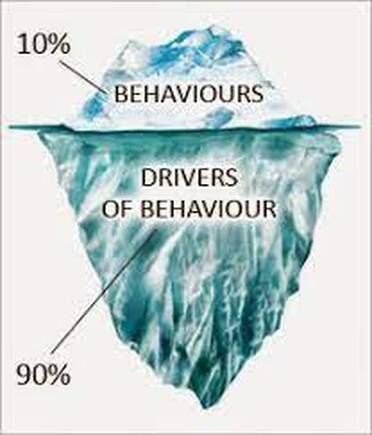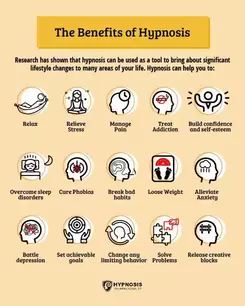|
The purpose of hypnosis as a therapeutic technique is to help you understand and gain more control over your behavior, emotions, or physical well-being. – The Mayo Clinic Clinical Hypnosis based upon the research is also one of the components of care offered through the Veterans Administration (VA) as an evidenced base care effective for Veteran populations. |
|
.
|
What is Clinical Hypnosis?Hypnosis, also called hypnotherapy, is a state of deep relaxation and focused concentration. It’s a type of mind-body medicine.
A trained and certified clinical hypnotist guides you into this deep state of focus and relaxation with verbal cues, repetition, and imagery. When you’re under hypnosis, this intense level of concentration and focus allows you to ignore ordinary distractions and be more open to guided suggestions to make changes to improve your health. How does hypnosis work? How hypnosis works isn’t completely understood. However, it’s commonly believed that in the deep state of focus and relaxation that’s achieved with hypnosis:
Common mental health uses include:
How do people describe the hypnotic experience? People describe hypnosis in different ways. You may feel like you’re “zoned in” or in a trance-like state — so focused that you’re able to block out surrounding distractions. Have you ever been so focused on a TV show or so entrenched in a good book that you don’t hear your family talking around you or even your dog barking? This experience is somewhat similar to how you might feel while hypnotized. Most people feel calm and relaxed despite their increased concentration. Most describe it as a relaxing pleasant experience. What typically happens during a hypnotic session? There are four stages of hypnosis: induction, deepener, suggestions and emergence. Induction During this stage, you begin to relax, focus your attention and ignore distractions. Your hypnotherapist will guide you through this stage with specific techniques such as controlled breathing (breathing in over a count of seven, then breathing out over a count of 11), or progressive muscle relaxation (tensing muscles as you breathe in and relaxing muscles as you breathe out, then repeating in a certain order of muscle groups throughout your body) or focusing on a visual image. Deepener This stage continues the first stage, taking your relaxation and focus to a deeper level. This step often involves counting down or using similar descending imagery such as walking down stairs or slowly sinking deeper and deeper into a comfortable bed. These first two stages are aimed at easing your openness to suggestions. Suggestions This is the stage for actual change in experience, behavior, or perception. Your hypnotherapist will use imagery and carefully chosen language. The suggestions are usually symptom-focused (to resolve a symptom) or exploratory (to explore experiences associated with the start of symptoms). Suggested changes may be in perception, sensation, emotion, memory, thought, or behavior.
During this stage, you come out of hypnosis. We may use reverse deepeners, such as giving you the suggestions that you’re climbing up stairs or counting up. Is hypnosis used as the sole treatment? Hypnosis is usually used along with other therapies and treatments, as part of a complete total treatment plan. The decision to use hypnotherapy in a clinical setting as a sole treatment or as an add-on treatment in psychotherapy or traditional medicine is made in consultation with your therapist and depends on your treatment goals. What’s the typical length of treatment with hypnotherapy? There’s no typical length. Treatment varies depending on what and how severe the issue is. Hypnotherapy may take one session or multiple depending on your treatment goals. Most people report benefits as early as their first session. Risks & Benefits Does hypnotherapy work? Despite its use since the 1700s, hypnotherapy continues to have skeptics in the medical community. However, clinical hypnosis is well documented and researched form of therapy. It is used by hospitals, mental health clinics, the Veterans Administration, pain specialists, and many more settings with strong success. The strongest evidence supporting the use of hypnotic treatments comes from research on hypnosis for treating pain, IBS, PTSD and habit-stopping. Can anyone be hypnotized? Each person differs in their ability to be hypnotized. A person’s fears or concerns about hypnosis may interfere with their ability to be hypnotized. What type of person benefits the most from hypnosis? The person most likely to benefit is the person who’s highly motivated to overcome an issue. Like any other treatment, hypnosis may be helpful for certain conditions or in certain people, but it can also be unhelpful. Is hypnotherapy inappropriate for some people or in certain situations? Hypnosis may not be appropriate for people with severe mental health issues, such as psychotic symptoms, including hallucinations and delusions. It might also be inappropriate for someone who uses drugs or alcohol. The use of hypnosis for memory retrieval is largely unsupported by research. Caution is also advised regarding its use in managing stressful events from early life. The use of hypnosis in these situations may create false memories, especially if unintended suggestions are given, and could cause more distress and anxiety. FREQUENTLY ASKED QUESTIONS Is clinical hypnosis risky? Hypnotherapy is a safe procedure when done by a trained therapist. Hypnotherapy isn’t mind control or brainwashing. Your therapist can’t make you do something embarrassing or something you don’t want to do. Is self-hypnosis possible? Yes, it’s possible to practice self-hypnosis. Deep breathing, imagery, progressive muscle relaxation, and mindfulness techniques may work similarly to aspects of hypnosis. This can be particularly useful for controlling the side effects of chemotherapy or managing recurring (repeating) health issues, such as headache pain. What is sleep hypnosis? Sleep hypnosis is using hypnotherapy to manage sleep problems, such as insomnia and sleep anxiety. It’s not about helping you sleep during a hypnotherapy session. Sleep hypnotherapy helps you work on the underlying issues that prevent you from getting quality sleep. Sleep hypnotherapy may be used along with other treatments, such as cognitive behavioral therapy for insomnia. Can we do Hypnosis remotely? Yes, clinical hypnosis works great in online settings. |


